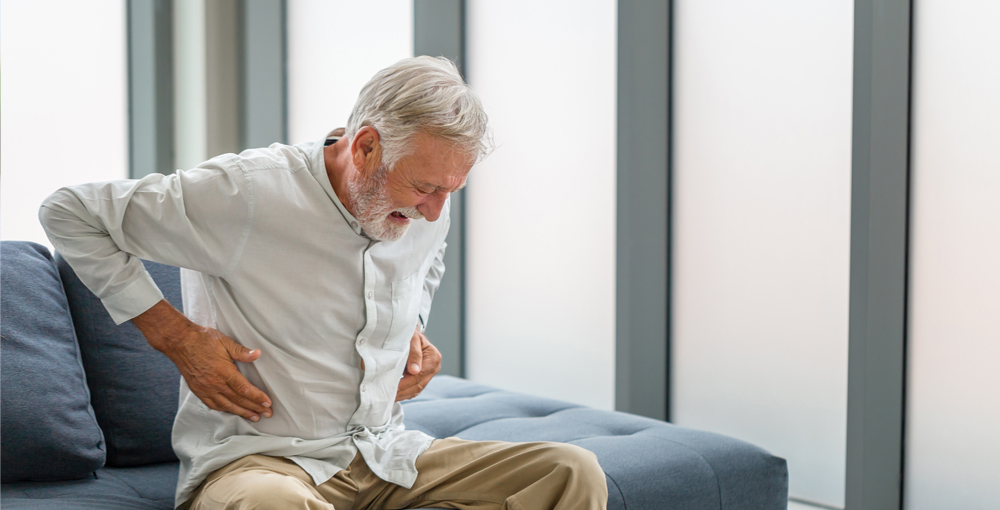Could my extreme abdominal pain be caused by kidney stones?
April 14, 2022

Experiencing sudden or recurring pain in your abdomen and/or back can be unsettling. It can also leave you wondering if the pain is caused by a kidney stone. More than half a million people visit emergency rooms each year for kidney stone complications, and it is estimated that 1 out of 10 people will develop a kidney stone in their lifetime.
With the prevalence of kidney stones on the rise—up from 3.8% in the 1970’s to 10% in 2013-2014—it is important to recognize the symptoms of kidney stones and when to seek treatment.
What is a kidney stone?
“Passing kidney stones is a fairly common occurrence, but it can be extremely painful, and if it’s a person’s first time to experience this, it can be quite alarming and scary,” says Dr. David Gude, Texas MedClinic’s Chief Operating Officer and practicing physician.
Kidney stones are small, firm, masses of crystals that form in one or both kidneys when urine contains high levels of certain minerals.
Small kidney stones often pass through the urinary tract unnoticed and without much pain. Larger kidney stones, however, may become stuck, causing blood to appear in your urine and discomfort that can be severe. Additionally, it is possible for a stone to completely block the ureter, in which case no blood is seen because no urine can pass.
What are the symptoms associated with kidney stones?
Common symptoms associated with kidney stones include:
- Pain, sometimes severe, in either side of the lower back. During an attack, pain may build to a peak intensity then subside, much like labor pains. The pain often shifts down the back or abdomen as the stone moves, frequently radiating to the groin.
- General abdominal pain or a persistent stomachache
- Nausea and/or vomiting
- The appearance of blood in urine
- A burning sensation when urinating
- A persistent need to urinate
- Foul smelling urine or urine that appears cloudy
What are the risk factors associated with kidney stones?
Men are twice as likely to develop kidney stones than women. Other risk factors include:
- Dehydration – Not drinking enough water causes low urine volume (meaning urine is more concentrated) and increasing your risk of developing kidney stones.
- Diet – People who consume excessive amounts of sodium are at greater risk of developing kidney stones.
- Obesity
- Taking certain medications
- A family history of kidney stones
How do I know if my symptoms are caused by kidney stones?
If you are experiencing severe or recurring abdominal pain, schedule an appointment with your nearest Texas MedClinic as soon as possible. Your doctor will perform a physical exam and urinalysis. He or she may also order bloodwork and imaging tests (like a CT scan or ultrasound) to determine the size and shape of your kidney stone.
How are kidney stones treated?
With time – Smaller kidney stones often pass on their own without medical intervention. This can take up to 4 – 6 weeks. You may need to take pain medication while waiting for the stone to pass.
With medication – Your doctor may prescribe medication for you to take that will relax the muscles of the ureter (the tube that carries urine from the kidney to the bladder), making it easier for the stone to pass.
With surgery – If you have a developed a large stone, are unable to pass a smaller stone, or are experiencing significant pain, surgery may be required to remove your kidney stone.
What can I do to avoid getting kidney stones?
There are things you can do at home to reduce your risk of developing kidney stones:
- Drink enough water – Try to drink 2 – 3 quarts (or 8 – 12 cups) of water each day
- Drink more to account for sweating – We all know how hot Texas summers can be. It is important to stay hydrated when working outdoors or when temperatures are high. If you are sweating, you should be drinking water. For more information on how to avoid dehydration, click here to read our article on water intake recommendations.
- Reduce your sodium intake – About 90% of Americans consume too much sodium. The CDC recommends eating a diet with fewer than 2,300mg of sodium each day. Reducing the amount of sodium you consume is not just good for your kidneys—it also reduces your risk of high blood pressure, heart attack and stroke.




